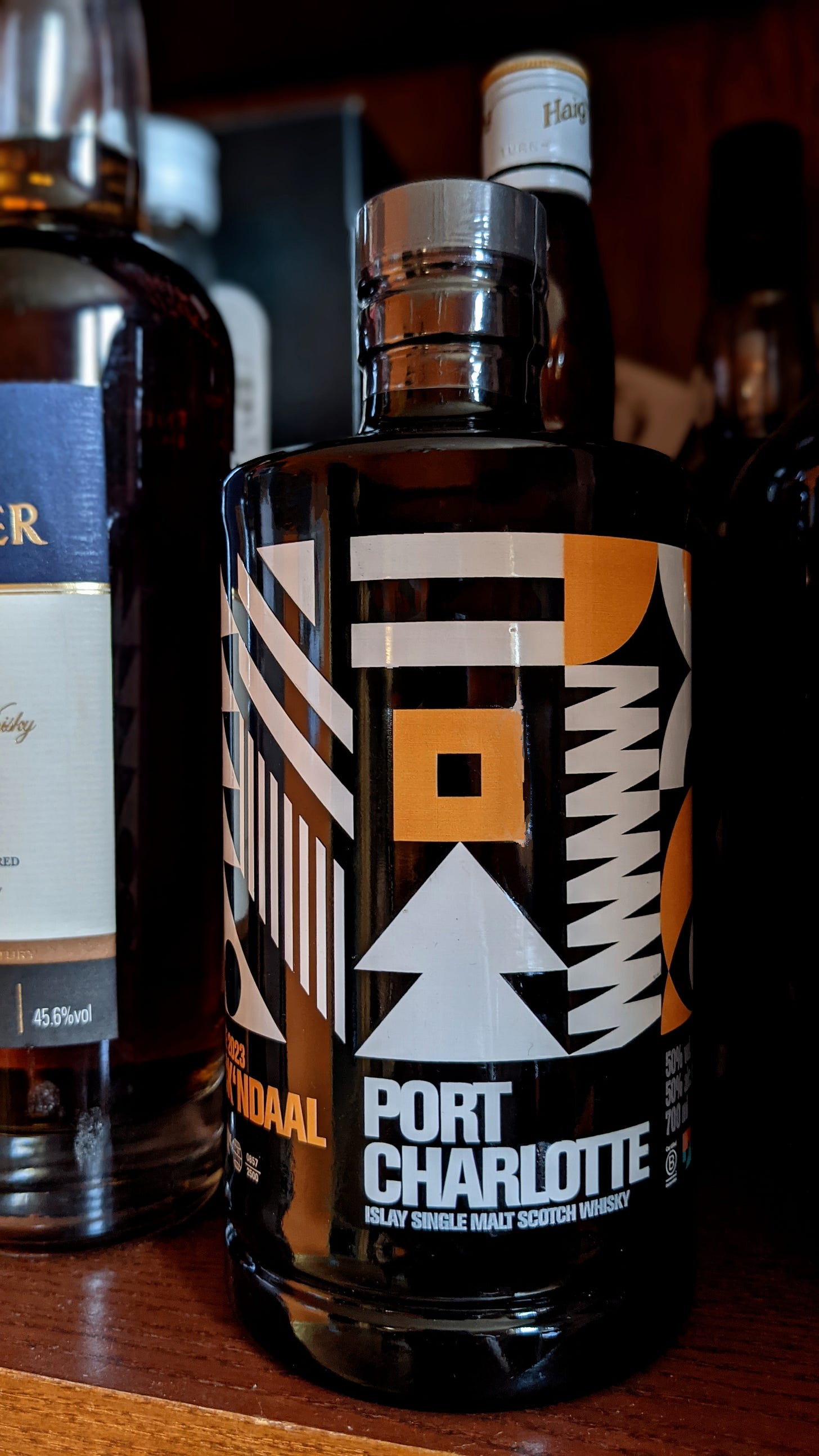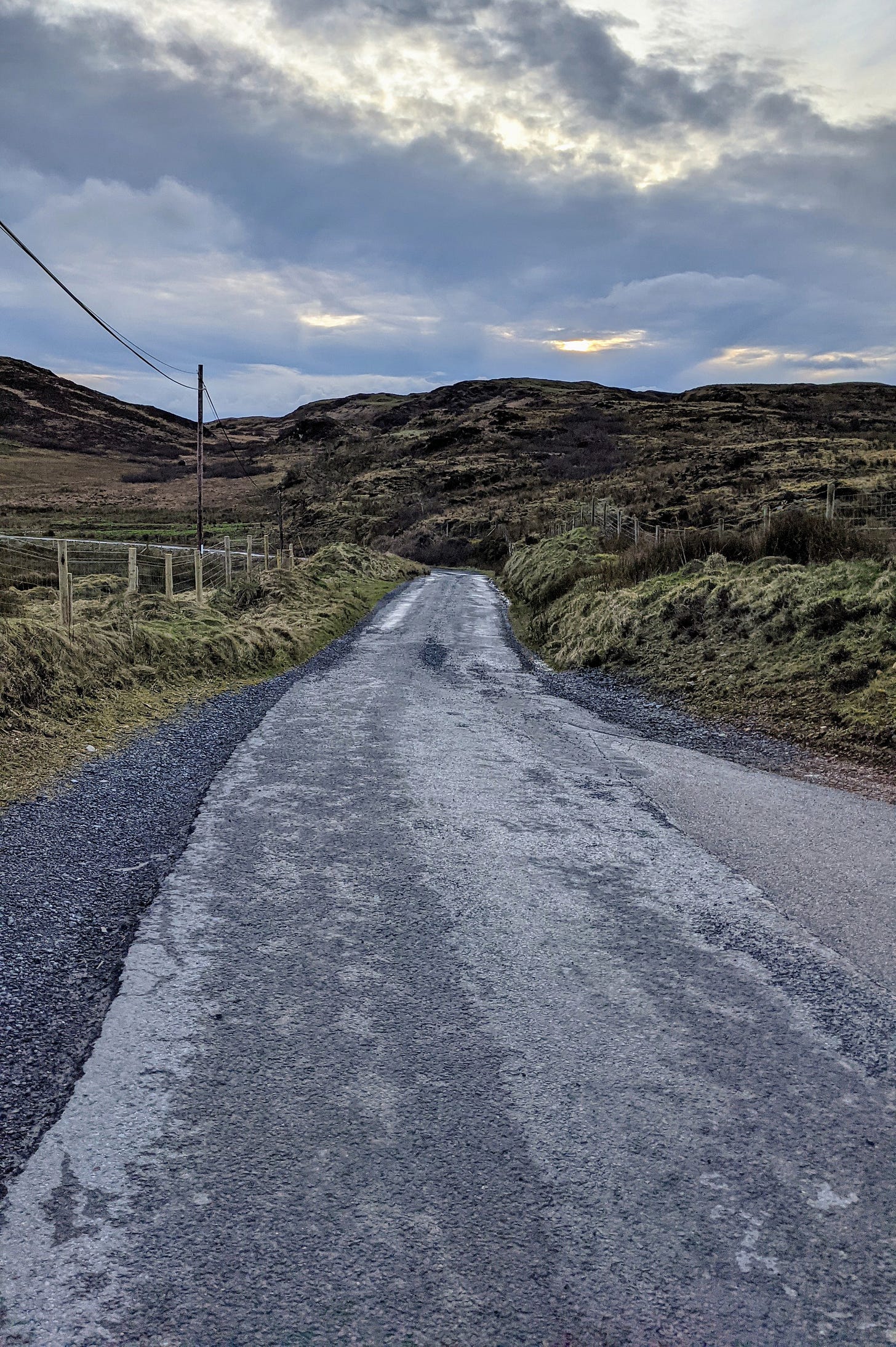Port Charlotte 16 Year Old–Feis Ile 2023, 50%
A Postcard from Islay
It’s been a long day courtesy of back to back distillery visits, so Charles and I head to the Port Charlotte Hotel for a cheeky pint before dinner, when in Rome and all that. The first sip of Islay Ales’ Finlaggan IPA is crisp and tastes good, and with only three of us in the bar idle banter starts up. It’s the Islay way, and I love unfiltered chat with strangers in pubs.
“Yea, that’s production schedules being cut back at distilleries all over the island,” our mate volunteers when they learn we’ve come to Islay for the whisky. “No talk of this, or how attendance has fallen at Feis Ile, but it can't bode well for the industry as a whole.”
Our newly purchased bottle of Port Charlotte 16 Year Old immediately comes to mind. It was one of the “favourites” of our tour guide at Bruichladdich earlier in the day, a limited edition bottled for last year’s Feis Ile, Islay’s annual festival of music and malt – and only a few bottles left, lucky us! But still being available a year after the occasion suggests that not only has attendance fallen, but so has visitors’ interest in the festival’s limited editions, at one time worth their weight in gold as whisky geeks camped out overnight for the chance to purchase these distillery exclusives.
Despite having visited Islay on numerous occasions, we’ve yet to attend Feis Ile (because crowds) so I simply parrot what we’ve been hearing since last summer: yes, attendance at Feis has been falling, and it’s a palpable concern among Ileachs — Islay's native population — many of whom have asked if we’re coming back in May, for the most significant event of their community’s local economy.
But a declining interest in the festival can’t be entirely down to a falling interest in Islay’s whisky, I wonder out loud. I think of how frequently we’ve heard staff at different distilleries grouse about the corporatization of Feis Ile, and the increased involvement of ‘head office’ who fancy the occasion as their Coachella. It’s a stark contrast to the earlier days of a more organic celebration, when the distilleries were left to plan their own festivities and, more importantly, select their own casks for bottling.
And certainly an erratic ferry schedule hasn’t been kind to Islay, but any mention of CalMac sours the milk these days. Instead I steer the conversation towards Bruichladdich’s updated packaging, and how I’m crushing on both the whisky and the new colour scheme, in particular the smart dressing of the Bruichladdich 18 Year Old launched earlier in the day. Admittedly the recycled cardboard sleeve struggles to say luxury (much less re/defined) but I admire the clever design, along with the ethos behind the distillery’s B-corp certification that puts people, community and environment ahead of profit.
Our new acquaintance disagrees. “Nae, that’s them changing the brand’s colour, the brand’s heritage. What’s next, you have to wonder?”
I’m tempted to interject that the heritage in question is but the last twenty years of a distillery established in 1881. It’s been a dozen years since Rémy Cointreau purchased the distillery so they can hardly be accused of indecent haste. But best to let people speak their mind, so as an outsider I sit and listen.
“It’s just not the same since the distillery was sold. And see how they’re not talking about how many people have left Bruichladdich since?” I say nothing but quietly wonder what company would.
“My brother-in-law left last year, workload became unreasonable between travel and now virtual sessions at all hours of the day and night, and with no extra compensation. At least Reynier was here for the people.”
I find this last bit amusing given that Mark Reynier was very much viewed as an outsider, the stranger from afar, when he arrived on Islay to resuscitate Bruichladdich in 2001. People have a short memory: Bruichladdich’s disruption was met with ‘tut-tuts’ and pearl clutching from all quarters, not the least of which was from Ileachs who were leery of Reynier’s bombastic approach. He was a polarizing figure whose rebranding of the Victorian distillery engendered much consternation, from painting the buildings with ‘that garish turquoise’, to the distillery’s Gaelic motto of ‘clachan a choin’ — a reference to canine testicles, and a piece of heritage that Rémy Cointreau quietly dropped once it assumed ownership.
But I’m just a visitor so keep my thoughts to myself, instead voicing my admiration for the employment opportunities that Reynier created on Islay, and that Bruichladdich still maintains more than seventy jobs on the island, quoting a soundbite from our tour guide’s script.
“Go on,” our pub mate points down the road, “go and ask them how many people working there are actually from Islay. Sure they may live on Islay, but how many are actually from here?” I’m confused, then quickly realize that emphasis is being placed on the word ‘from’.
“Bruichladdich claim to be ‘progressive Hebridean distillers’. But how can you talk about making an Islay whisky, how can you talk about terroir, when the whisky’s not being made by people who are from Islay, actual Ileachs?”
This last line of reasoning hits a nerve and echoes the questions of immigration that are rife in the current news cycle. How do you define an Ileach? Can a mainlander become one? Can a foreigner? Or for that matter a Sassenach, such as a wine merchant from London?
“Now they’re just another company on Islay taking advantage of our reputation, they don’t care about the community itself. Reynier had ties to the island, he’d been coming to Islay for holidays with his family.”
It’s bemusing to hear how the case for a connection to Islay — however tenuous — can be made when it suits the narrative. Despite being English, Mark Reynier is largely viewed as a local hero. But his goodwill and social capital has been hard won, and the suggestion of a longstanding tradition of family holidays is a creative departure from the original story of a wine merchant ‘on holiday’ when he cycled past the shuttered gates of Bruichladdich.
But our pub mate is on a roll, and I’m another outsider, so I keep to my place.
“Like the ones coming to build distilleries. We don’t need any more distilleries. They keep telling us that they’re bringing jobs to the island, but we don’t need any more jobs, we have 0.3% unemployment. Many folk are already working two jobs. There’s a choice of where to work, but no place to live.”
No place to live: I remember hearing this on Arran, and again on Skye, where Talisker is looking at building its own accommodation to house staff for its expanded visitor centre.
“Here’s an idea: how about fixing our roads and improving the infrastructure? There was a proposal being floated with the MSP to go to Westminster and ask the Exchequer to create an infrastructure fund that returned one cent to Islay for every litre of whisky that left the island. We’re still waiting for someone to work up the nerve to do that.”
I think of the potholes we dodged on our way to Bunnahabhain that morning, and of the taxi driver who told us he was no longer taking passengers that way until something was done about it.
“That’s what happens when you have people coming to Islay to build distilleries and use our island as part of their ‘brand’. They’re not interested in our roads or community or infrastructure.”
It’s the first time I’ve been asked to contemplate Islay as a brand, and I find myself hard-pressed to come up with a counter argument. I take another sip of my IPA.
“Look what's happening with the new distillery under construction at Farkin. They originally came to make Islay whisky — with what water and what malt, who knows — and now the plan is to make Islay rum and Islay vodka as well. It’s all about capitalizing on the island as a brand. But we’ve already got an Islay rum. And he’s just a young lad that started up not too long ago, and here’s a corporation coming along to compete with him. It’s not fair. It’s not the Islay way.”
I had quite enjoyed Islay Peat Spiced Rum the night before and applauded the ingenuity of merging the two flavour profiles, not to mention two island traditions. But the thought of a young, local entrepreneur competing against seasoned drinks mongers with deep pockets left me with an admittedly bitter taste, and again one that I had never before contemplated.
“We’re an island: folk here have long memories. Look at the ones who came to Islay, opened a distillery in 2019, and now close their visitor centre and laid everyone off this past Christmas, by email. We’ll remember this. We’ll remember that management couldn’t be bothered to take a 45-minute flight from Glasgow to tell folk to their face, sending an email instead, spouting nonsense about profitability. As if folk here can’t search the internet and find out that they posted a £6-million profit for their mainland business last year.”
I think of people talking to us about the pain of the 1980s ‘whisky loch’ when demand fell and lay-offs affected all the distilleries on the island. ‘Everyone knew someone who lost their job’ is a common refrain on Islay. Having already heard from a number of locals that this latest closure was triggering — even for a visitor centre, even just temporarily — I knew that we were hearing the sentiments of the community at large.
“Laying off staff by email, just shameful. Folk here will remember that, and many won’t want to work for that kind of ownership. It’s not the Islay way.”
I take the last sip of my pint. On this point we can agree.





